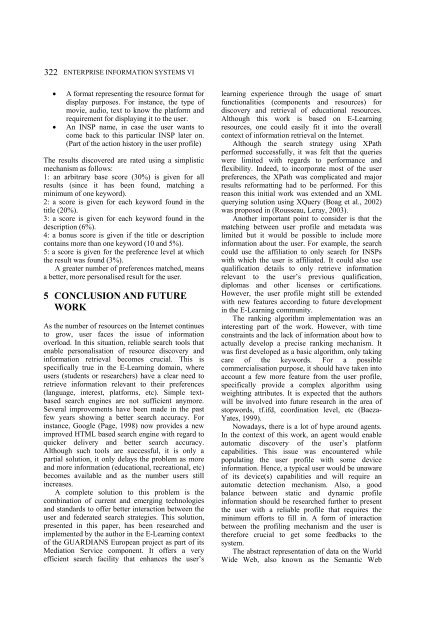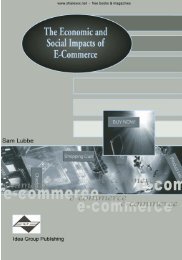Back Room Front Room 2
Back Room Front Room 2
Back Room Front Room 2
Create successful ePaper yourself
Turn your PDF publications into a flip-book with our unique Google optimized e-Paper software.
322<br />
ENTERPRISE INFORMATION SYSTEMS VI<br />
� A format representing the resource format for<br />
display purposes. For instance, the type of<br />
movie, audio, text to know the platform and<br />
requirement for displaying it to the user.<br />
� An INSP name, in case the user wants to<br />
come back to this particular INSP later on.<br />
(Part of the action history in the user profile)<br />
The results discovered are rated using a simplistic<br />
mechanism as follows:<br />
1: an arbitrary base score (30%) is given for all<br />
results (since it has been found, matching a<br />
minimum of one keyword).<br />
2: a score is given for each keyword found in the<br />
title (20%).<br />
3: a score is given for each keyword found in the<br />
description (6%).<br />
4: a bonus score is given if the title or description<br />
contains more than one keyword (10 and 5%).<br />
5: a score is given for the preference level at which<br />
the result was found (3%).<br />
A greater number of preferences matched, means<br />
a better, more personalised result for the user.<br />
5 CONCLUSION AND FUTURE<br />
WORK<br />
As the number of resources on the Internet continues<br />
to grow, user faces the issue of information<br />
overload. In this situation, reliable search tools that<br />
enable personalisation of resource discovery and<br />
information retrieval becomes crucial. This is<br />
specifically true in the E-Learning domain, where<br />
users (students or researchers) have a clear need to<br />
retrieve information relevant to their preferences<br />
(language, interest, platforms, etc). Simple textbased<br />
search engines are not sufficient anymore.<br />
Several improvements have been made in the past<br />
few years showing a better search accuracy. For<br />
instance, Google (Page, 1998) now provides a new<br />
improved HTML based search engine with regard to<br />
quicker delivery and better search accuracy.<br />
Although such tools are successful, it is only a<br />
partial solution, it only delays the problem as more<br />
and more information (educational, recreational, etc)<br />
becomes available and as the number users still<br />
increases.<br />
A complete solution to this problem is the<br />
combination of current and emerging technologies<br />
and standards to offer better interaction between the<br />
user and federated search strategies. This solution,<br />
presented in this paper, has been researched and<br />
implemented by the author in the E-Learning context<br />
of the GUARDIANS European project as part of its<br />
Mediation Service component. It offers a very<br />
efficient search facility that enhances the user’s<br />
learning experience through the usage of smart<br />
functionalities (components and resources) for<br />
discovery and retrieval of educational resources.<br />
Although this work is based on E-Learning<br />
resources, one could easily fit it into the overall<br />
context of information retrieval on the Internet.<br />
Although the search strategy using XPath<br />
performed successfully, it was felt that the queries<br />
were limited with regards to performance and<br />
flexibility. Indeed, to incorporate most of the user<br />
preferences, the XPath was complicated and major<br />
results reformatting had to be performed. For this<br />
reason this initial work was extended and an XML<br />
querying solution using XQuery (Boag et al., 2002)<br />
was proposed in (Rousseau, Leray, 2003).<br />
Another important point to consider is that the<br />
matching between user profile and metadata was<br />
limited but it would be possible to include more<br />
information about the user. For example, the search<br />
could use the affiliation to only search for INSPs<br />
with which the user is affiliated. It could also use<br />
qualification details to only retrieve information<br />
relevant to the user’s previous qualification,<br />
diplomas and other licenses or certifications.<br />
However, the user profile might still be extended<br />
with new features according to future development<br />
in the E-Learning community.<br />
The ranking algorithm implementation was an<br />
interesting part of the work. However, with time<br />
constraints and the lack of information about how to<br />
actually develop a precise ranking mechanism. It<br />
was first developed as a basic algorithm, only taking<br />
care of the keywords. For a possible<br />
commercialisation purpose, it should have taken into<br />
account a few more feature from the user profile,<br />
specifically provide a complex algorithm using<br />
weighting attributes. It is expected that the authors<br />
will be involved into future research in the area of<br />
stopwords, tf.ifd, coordination level, etc (Baeza-<br />
Yates, 1999).<br />
Nowadays, there is a lot of hype around agents.<br />
In the context of this work, an agent would enable<br />
automatic discovery of the user’s platform<br />
capabilities. This issue was encountered while<br />
populating the user profile with some device<br />
information. Hence, a typical user would be unaware<br />
of its device(s) capabilities and will require an<br />
automatic detection mechanism. Also, a good<br />
balance between static and dynamic profile<br />
information should be researched further to present<br />
the user with a reliable profile that requires the<br />
minimum efforts to fill in. A form of interaction<br />
between the profiling mechanism and the user is<br />
therefore crucial to get some feedbacks to the<br />
system.<br />
The abstract representation of data on the World<br />
Wide Web, also known as the Semantic Web









